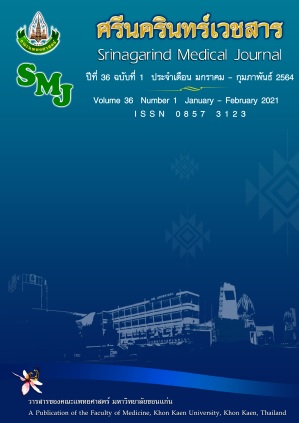Association of Self-Care Behaviors and Beliefs about Diabetes with Glycemic Control of Type 2 Diabetic Patients in a Multiethnicity Area, Nakae District, Nakhonphanom Province
Abstract
ความสัมพันธ์ของพฤติกรรมการดูแลตนเองและความเชื่อเกี่ยวกับโรคเบาหวานกับการควบคุมระดับน้ำตาลในเลือดของผู้ป่วยเบาหวานชนิดที่ 2 ในพื้นที่ที่มีความหลากหลายเชื้อชาติ อำเภอนาแก จังหวัดนครพนม
ศศิวรรณ ขันทะชา1, เบญจา มุกตพันธุ์2*
1หลักสูตรสาธารณสุขศาสตรมหาบัณฑิต คณะสาธารณสุขศาสตร์ มหาวิทยาลัยขอนแก่น
2กลุ่มวิจัยการป้องกันและควบคุมโรคเบาหวานในภาคตะวันออกเฉียงเหนือ และบัณฑิตวิทยาลัยมหาวิทยาลัยขอนแก่น (ผู้รับผิดชอบบทความ)
หลักการและวัตถุประสงค์ : พฤติกรรมการดูแลตนเองและความเชื่อด้านสุขภาพอาจส่งผลต่อการควบคุมระดับน้ำตาลในเลือดของผู้ป่วยเบาหวาน การศึกษานี้มีวัตถุประสงค์เพื่อหาความสัมพันธ์ของพฤติกรรมการดูแลตนเองและความเชื่อเกี่ยวกับโรคเบาหวานกับระดับน้ำตาลในเลือดสะสมของผู้ป่วยเบาหวานชนิดที่ 2
วิธีการศึกษา : เป็นการศึกษาเชิงวิเคราะห์ภาคตัดขวาง กลุ่มตัวอย่างเป็นผู้ป่วยเบาหวานชนิดที่ 2
จำนวน 290 ราย อาศัยอยู่ที่อำเภอนาแก จังหวัดนครพนม เก็บข้อมูลโดยใช้แบบสัมภาษณ์ลักษณะส่วนบุคคล พฤติกรรมการดูแลตนเอง ความเชื่อเกี่ยวกับโรคเบาหวาน และกิจกรรมทางกายใช้แบบสอบถามกิจกรรมทางกายระดับโลก ข้อมูลน้ำตาลในเลือดสะสมนำมาจากเวชระเบียนของคลินิกเบาหวาน โรงพยาบาล
อำเภอนาแก เก็บข้อมูลระหว่างมกราคม – กุมภาพันธ์ พ.ศ. 2563 วิเคราะห์ความสัมพันธ์ของพฤติกรรมการดูแลตนเองและความเชื่อเกี่ยวกับโรคเบาหวานกับระดับน้ำตาลในเลือดโดยใช้สถิติถดถอยพหุโลจิสติก
ผลการศึกษา : กลุ่มตัวอย่างเป็นเพศหญิงร้อยละ 80.3 อายุเฉลี่ย 58.9 ± 9.7 ปี เป็นชนเผ่าไทยกะเลิง ไทยญ้อ และภูไท ร้อยละ 50.7, 19.3 และ 17.6 ตามลำดับ กลุ่มตัวอย่างที่คุมน้ำตาลในเลือดได้ (HbA1c < 7%) มีเพียงร้อยละ 20.7 และกลุ่มที่คุมน้ำตาลในเลือดไม่ได้ในระดับที่มีความเสี่ยงสูง (HbA1c > 8%) พบร้อยละ 59.3 การวิเคราะห์ถดถอยพหุโลจิสติกเมื่อควบคุมตัวแปรเพศและชนเผ่า พบว่า อายุ > 60 ปี (ORadj= 0.37, 95% CI: 0.21-0.62) การเป็นโรคเบาหวาน ≥ 10 ปี (ORadj = 2.13, 95% CI: 1.25 - 3.62) และการดื่มเครื่องดื่มรสหวาน ≥ 1 ครั้ง/สัปดาห์ (ORadj= 1.71, 95% CI: 1.03 - 2.83) มีความสัมพันธ์กับการควบคุมน้ำตาลไม่ได้ในระดับเสี่ยงสูง (HbA1c ≥ 8%) สำหรับความเชื่อไม่พบมีความสัมพันธ์กับระดับน้ำตาลในเลือดสะสม
สรุป : ผู้ป่วยเบาหวานชนิดที่ 2 ส่วนใหญ่ไม่สามารถควบคุมระดับน้ำตาลในเลือดได้ ในการดำเนินโครงการเพื่อส่งเสริมสุขภาพของผู้ป่วยเบาหวานควรเน้นการลดการดื่มเครื่องดื่มรสหวานโดยเฉพาะผู้ป่วยที่เป็นเบาหวานมานาน และอยู่ในวัยกลางคน
คำสำคัญ : ผู้ป่วยเบาหวานชนิดที่ 2; เชื้อชาติ; พฤติกรรมการดูแลตนเอง; ความเชื่อเกี่ยวกับโรคเบาหวาน; การควบคุมระดับน้ำตาลในเลือด
Background and objectives: Self-care behavior and health beliefs may affect blood sugar control of type 2 diabetes. This study aimed to examine the relationship of self-care behaviors and beliefs about diabetes with the level of HbA1c of type 2 diabetic patients.
Methods: This cross-sectional analytical study was conducted in 290 type 2 diabetic patients living in Nakae District, Nakhonphanom Province. Information was collected during January to February 2020 using a structured questionnaire including general characteristics, self-care behaviors, and beliefs about diabetes. Global physical activity questionnaire was used to collect data of physical activity. HbA1c data was retrieved from the medical record of Nakae Hospital. Multiple logistic regression was performed to analyze the association of self-care behavior and the belief about diabetes with blood sugar level.
Results: Eighty percent of the participants were female with an average age of 58.9 ± 9.7 years. They belonged to three different ethnic groups, namely 50.7 to the Thai Kaleng, 19.3% to the ThaiYor and 17.6% to the Phutai. Only 20.7% of the patients were able to properly control their blood sugar (HbA1c < 7%), but 59.3% had elevated HbA1c values (HbA1c ≥ 8%). For multiple logistic regression analysis which was adjusted by ethnic groups showed that age ≥ 60 years (ORadj = 0.37, 95% CI: 0.21 - 0.62), having diabetes for ≥ 10 years (ORadj = 2.13, 95% CI: 1.25 - 3.62) and frequent consuming sweet drinks (≥ 1 time/week) (ORadj= 1.71, 95% CI: 1.03 - 2.83) were statistical significantly associated with poorly controlled of blood sugar (HbA1c ≥ 8%). While the beliefs about diabetes was not found to be associated with HbA1c level.
Conclusions: The majority of the patients with type 2 diabetes poorly controlled their blood sugar level. Implementing programs to promote the health of diabetic patients, should emphasis on reducing the consumption of sweetened beverages, especially for those with diabetes for a long time and in their middle age.
Keywords: Type 2 diabetic patients; ethnic; self-care behavior; beliefs about diabetes; glycemic control


